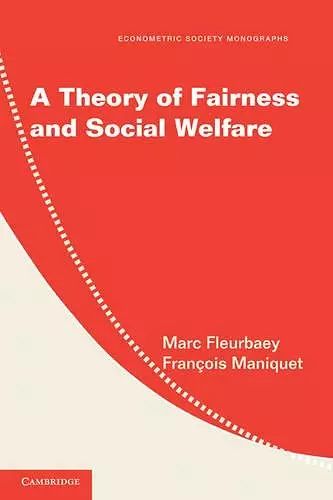A Theory of Fairness and Social Welfare
François Maniquet author Marc Fleurbaey author
Format:Hardback
Publisher:Cambridge University Press
Published:13th Jun '11
Currently unavailable, and unfortunately no date known when it will be back
This hardback is available in another edition too:
- Paperback£36.99(9780521715348)

This book proposes a theory of social welfare that encapsulates fairness principles in the definition of social preferences.
This book proposes a theory of social welfare that draws from the theory of social choice and the theory of fair allocation and encapsulates fairness principles in the definition of social preferences.The definition and measurement of social welfare have been a vexed issue for the past century. This book makes a constructive, easily applicable proposal and suggests how to evaluate the economic situation of a society in a way that gives priority to the worse-off and that respects each individual's preferences over his or her own consumption, work, leisure and so on. This approach resonates with the current concern to go 'beyond the GDP' in the measurement of social progress. Compared to technical studies in welfare economics, this book emphasizes constructive results rather than paradoxes and impossibilities, and shows how one can start from basic principles of efficiency and fairness and end up with concrete evaluations of policies. Compared to more philosophical treatments of social justice, this book is more precise about the definition of social welfare and reaches conclusions about concrete policies and institutions only after a rigorous derivation from clearly stated principles.
'Fleurbaey and Maniquet are among the outstanding scholars in the development of formal theories of social choice and justice today. Their many original contributions and synthesis, in the present volume, are masterly and go well beyond what can be said in the usual philosophical language. The concepts of fair and efficient resource allocations have been enriched by their work.' Kenneth J. Arrow, Stanford University and Nobel Laureate in Economics
'In this monograph Marc Fleurbaey and François Maniquet, two major representatives of a modern Franco-Belgian school of social choice, systematically set out a new approach to social choice based on concepts such as fairness and resource equality. It should interest not just economists and social choice theorists, but also philosophers who agree with the argument that social justice is a matter of allocating resources rather than subjective satisfaction or happiness.' Peter J. Hammond, University of Warwick
'Theoretical attempts to aggregate individual preferences into a measure of social welfare have been plagued by negative results, including Arrow's famous theorem. Yet, in this important book, Fleurbaey and Maniquet show that an attractive theory of aggregation is possible if one relaxes Arrow's independence axiom in a natural way. The approach is rigorous yet conceptually simple enough to be usable in practice.' Eric S. Maskin, Institute for Advanced Study, Princeton and Nobel Laureate in Economics
'Fleurbaey and Maniquet's axiomatic synthesis of social welfare a la Arrow, and justice as equality of resources, is deeply original and entirely rigorous. Preserving the normative preeminence of efficiency and giving precedence to equal opportunity over informational parsimony, they construct a dazzling array of concrete allocation mechanisms, from income taxation to the fair division of indivisible commodities, and the provision of public goods. This brilliant book turns welfare economics into a powerful deconstruction of the social justice dilemmas.' Hervé Moulin, Rice University
'Marc Fleurbaey and François Maniquet's book constitutes an outstanding contribution, suitable (and highly recommended) for the broad audience of mainstream economists and policy makers alike, and a 'must read' for those with a taste for normative economics. One can only wish that books like this one get published more often.' Journal of Economic Inequality
ISBN: 9780521887427
Dimensions: 229mm x 152mm x 22mm
Weight: 640g
316 pages